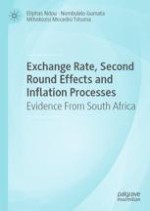2019 | OriginalPaper | Buchkapitel
16. Does Trade Openness or Globalisation Matter for the Response of Inflation to Exchange Rate Depreciation Shocks?
verfasst von : Dr. Eliphas Ndou, Nombulelo Gumata, Dr. Mthokozisi Mncedisi Tshuma
Erschienen in: Exchange Rate, Second Round Effects and Inflation Processes
Aktivieren Sie unsere intelligente Suche, um passende Fachinhalte oder Patente zu finden.
Wählen Sie Textabschnitte aus um mit Künstlicher Intelligenz passenden Patente zu finden. powered by
Markieren Sie Textabschnitte, um KI-gestützt weitere passende Inhalte zu finden. powered by
